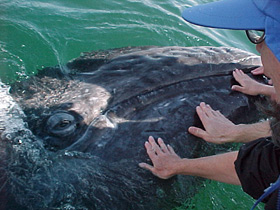 |
 |
 |
 News Around the Republic of Mexico | January 2006 News Around the Republic of Mexico | January 2006  
Authorities Alarmed by Rash of Whale Beaching Deaths
 E. Eduardo Castillo - Associated Press E. Eduardo Castillo - Associated Press


| | Poet Homero Aridjis, of the Mexican environmental organization Group of 100, said runoff from nearby coal mines might be contaminating the sea's waters. |
Mexico City - The deaths of eight whales found beached along the Sea of Cortez in the past two weeks have alarmed Mexican authorities who said on Friday they have never found so many in such a short time.

"There is reason for concern that in a period of 15 days we are seeing this many whale carcasses - and of big whales," said Luis Fueyo, director of Marine and Coastal Ecosystems Inspections for the government's environmental protection agency.

The beached whales - including three humpbacks, one gray, one finback and one minke - were found in Sinaloa and Sonora states along the 1,125 kilometer-long (700 mile-long) Sea of Cortez. Also known as the Sea of California, it separates the Baja California peninsula from mainland Mexico.

Authorities were investigating whether the deaths were linked to fishing - one of Mexico's most important industries. No nets were found, but the corpses were too badly decomposed to tell whether fishing nets may have been a factor in the whales' deaths, Fueyo said.

Another culprit could be marine algae, he added.

In a 2005 study, Stanford University researchers found agricultural runoff was triggering massive algae blooms in the Sea of Cortez. Excess algae growth sucks oxygen from the water, creating dead zones where few organisms can survive.

Poet Homero Aridjis, of the Mexican environmental organization Group of 100, said runoff from nearby coal mines might be contaminating the sea's waters.

"It is very alarming that in the few days in January there have been this many carcasses," said Aridjis, who demanded authorities take steps to protect the Sea of Cortez. | 
 | |
 |



